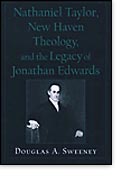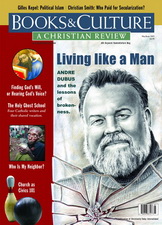 |
Douglas Sweeney’s biography of the 19th-century theologian Nathaniel Taylor is part of a whole wave of scholarship on high American religious history propelled by Oxford University Press and Harry Stout’s Religion in America series, and Eerdmans’ Library of Religious Biography, edited by Mark Noll, Nathan O. Hatch, and Allen Guelzo. This new religious history has many facets, but one of them, which Sweeney’s Nathaniel Taylor exhibits, is the attempt to breathe life into the history of American divinity. The book under review is a more than competent examination of Taylor’s ideas, but I am dubious if its style of presentation will resuscitate the subject.
Sweeney focuses on Taylor’s theology, which he knows inside-out and which he lays out in an articulate fashion. Although the body of the book is short (150 pages), the 100 pages of notes are a treasure trove for the serious scholar. Sweeney aims to demolish the view of Taylor as a clever Arminian; he argues that while Taylor did have a major impact on evangelicalism and revivalism, it was beneficial and in the respectable and “orthodox” tradition of Jonathan Edwards. While Sweeney may be pushing the conventional interpretation of Taylor a bit, his characterization of Taylor as far more than a high-class Charles Finney is certainly correct. But Sweeney’s overall strategy, which is to concentrate on Taylor’s claims to be an Edwardsean, does not satisfy me.
As many readers of this magazine will be aware, Taylor made his career at the Yale Divinity School. When Congregationalism in New England seemed to have reached a dead-end composed of a rigid theoretical determinism, on the one hand, and an inability to combat various Massachusetts religious liberals, on the other, Taylor revitalized thinking by elaborating on a spontaneous human freedom. His scheme avoided problems of Calvinist fatalism and provided the framework for a socially concerned ministry to operate in southern New England. Taylor had a set of brains to marvel at, and Sweeney is at his best in explicating his vision. Sweeney also emphasizes, rightly, that Taylor thought of himself as carrying on the tradition of Edwards, and demonstrates at length not just the quality of Taylor’s ideas but the way in which Taylor tried to think the tradition out of some of the troubles it had gotten itself into in its 75-year commentary on Edwards.
This is all to the good, but over and over again Sweeney tells us that Taylor was himself an Edwardsean. This special pleading falls short for three connected reasons.
First, Edwards’ philosophical inheritance lies in Locke and Hume; Taylor’s in Reid and Stewart. The latter developed a full-blown faculty psychology that is different from that of the former. Edwards’ philosophy of mind contradicts Taylor’s. It is as persuasive to call Taylor an Edwardsean as it is to call Reid a Lockean.
The second reason is that, consistent with his psychology, Taylor did elaborate a notion of the will’s “power to the contrary.” The bride at the altar could have said no, instead of yes, were her circumstances and character the same; she could have done otherwise—period. Not so for Edwards. He was a believer in a deterministic, causally governed world. This is the fundamental tenet of Freedom of the Will. Do we want to call someone an Edwardsean who denies this tenet?
The final reason is connected to this one, and readers will pardon an excursus into the thicket of theology. But it is necessary to make a point, for it is just this thicket that Sweeney cultivates.
For Taylor, the efficient cause of an act was the bride’s free will, an act of willing initiated by nothing but itself. Taylor himself did not think Edwards had stigmatized this position and made his own position compatible with Freedom of the Will by noting Edwards’ inferences from the work of his English Arminian antagonists, Daniel Whitby and Thomas Chubb. For Edwards, these men argued that a person acted without motives and, consequently, that the will was determined only by itself. Then, according to Edwards’ famous argument, a previous act of will determined the initial act. Edwards’ inference might have been fair, but no one defended such a position, for all believed that no one acted in the absence of motives, even if individuals were free to act, or not to act, in spite of all motives. Indeed, Taylor explicitly said that the will always acted with motives, so that the will alone never determined action—thereby, he thought, agreeing with the president. But his reason for agreeing was not that the will lacked spontaneity (which Edwards denied), but that motives always accompanied willing. Edwards’ original opponents in actuality limited the spontaneous power of the will in the same way that Taylor did. The will had a competency to attend or not to attend to a presented motive, and to act or not to act as it pleased. Do we want to call someone an Edwardsean who stands on this issue with Whitby and Chubb?
Why is Sweeney driven to make Taylor an Edwardsean? Some of this is a quibble over who gets called what, and the semantics leave much to be desired. I don’t care if Taylor is an Edwardsean or not. But Sweeney’s interest needs to be explained.
The main group of historians who see Taylor as a trickster and underminer of Calvinist verities are practicing Presbyterians, still clinging to the idea that Charles Hodge at Princeton should be regarded as the 19th century’s great figure, a thinker still unappreciated. Sweeney, I believe, is taking on this historiographic tradition. He wants to rescue Taylor from the descendants of the enemies he acquired at Princeton in the 1830s.
I sympathize with the rescue of Taylor, but what Sweeney has in mind is not the right way to go about it. Taylor is the major creative religious philosopher in America in the 100-year period between Edwards and Bushnell. To regard him as great, we do not need to claim him for the Edwardsean tradition; he is no more Edwardsean than Bushnell is, or is not, a Taylorian; or Edwards is a Lockean. He is just Taylor. Sweeney’s categorization—or rather the fact that he puts so much weight on making the categorization—suggests to me he is still caught up in the battles of 19th-century theology, as if what is at issue is how close, or not so close, these men were to The Truth of Edwards.
I began this review by intimating that one problem at issue is how likely it is that volumes such as Sweeney’s will resurrect these long gone but remarkably astute divines. I believe such studies of ideas will revitalize general interest in these men if the studies find a way themselves to break out of the grip of the New England Theology. If you doubt this conclusion, try to interest yourself in my paragraph eight.
Bruce Kuklick is Nichols Professor of History at the University of Pennsylvania. He is the author most recently of A History of Philosophy in America: 1720-2000 (Oxford Univ. Press).
Copyright © 2003 by the author or Christianity Today/Books & Culture magazine.Click here for reprint information on Books & Culture.









